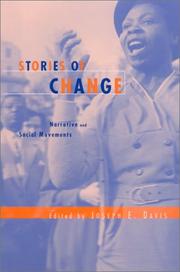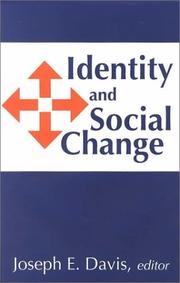| Listing 1 - 10 of 15 | << page >> |
Sort by
|

ISBN: 0791489531 0585450749 9780585450742 0791451917 9780791451915 0791451925 9780791451922 9780791489536 Year: 2002 Publisher: Albany State University of New York Press
Abstract | Keywords | Export | Availability | Bookmark
 Loading...
Loading...Choose an application
- Reference Manager
- EndNote
- RefWorks (Direct export to RefWorks)
Despite the amount of storytelling in social movements, little attention has been paid to narrative as a form of movement discourse or as a mode of social interaction. Stories of Change is a systematic study of narrative as well as a demonstration of the power of narrative analysis to illuminate many features of contemporary social movements. Davis includes a wide array of stories of change—stories of having been harmed or wronged, stories of conflict with unjust authorities, stories of liberation and empowerment, and stories of strategic success and failure. By showing how these stories are a powerful vehicle for producing, regulating, and diffusing shared meaning, the contributors explore movement stories, their functions, and the conditions under which they are created and performed. They show how narrative study can illuminate social movement emergence, recruitment, internal dynamics, and identity building.
Discourse analysis, Narrative. --- Social movements. --- Storytelling. --- Story-telling --- Telling of stories --- Oral interpretation --- Children's stories --- Folklore --- Oral interpretation of fiction --- Movements, Social --- Social history --- Social psychology --- Narrative discourse analysis --- Narration (Rhetoric) --- Performance --- Discourse analysis, Narrative --- Social movements --- Storytelling --- #SBIB:309H518 --- #SBIB:324H74 --- Verbale communicatie: sociologie, antropologie, sociolinguistiek --- Politieke verandering: sociale bewegingen

ISBN: 0226137813 Year: 2005 Publisher: Chicago (Ill.) : University of Chicago press,
Abstract | Keywords | Export | Availability | Bookmark
 Loading...
Loading...Choose an application
- Reference Manager
- EndNote
- RefWorks (Direct export to RefWorks)

ISBN: 0765800349 Year: 2000 Publisher: New Brunswick Transaction
Abstract | Keywords | Export | Availability | Bookmark
 Loading...
Loading...Choose an application
- Reference Manager
- EndNote
- RefWorks (Direct export to RefWorks)
Book
ISBN: 026810803X 0268108048 9780268108045 9780268108038 0268108021 9780268108021 0268108013 9780268108014 Year: 2020 Publisher: Notre Dame, Ind. University of Notre Dame Press
Abstract | Keywords | Export | Availability | Bookmark
 Loading...
Loading...Choose an application
- Reference Manager
- EndNote
- RefWorks (Direct export to RefWorks)
Although philosophy, religion, and civic cultures used to help people prepare for aging and dying well, this is no longer the case. Today, aging is frequently seen as a problem to be solved and death as a harsh reality to be masked. In part, our cultural confusion is rooted in an inadequate conception of the human person, which is based on a notion of absolute individual autonomy that cannot but fail in the face of the dependency that comes with aging and decline at the end of life. To help correct the ethical impoverishment at the root of our contemporary social confusion, The Evening of Life provides an interdisciplinary examination of the challenges of aging and dying well. It calls for a re-envisioning of cultural concepts, practices, and virtues that embraces decline, dependency, and finitude rather than stigmatizes them. Bringing together the work of sociologists, anthropologists, philosophers, theologians, and medical practitioners, this collection of essays develops an interrelated set of conceptual tools to discuss the current challenges posed to aging and dying well, such as flourishing, temporality, narrative, and friendship. Above all, it proposes a positive understanding of thriving in old age that is rooted in our shared vulnerability as human beings. It also suggests how some of these tools and concepts can be deployed to create a medical system that better responds to our contemporary needs. The Evening of Life will interest bioethicists, medical practitioners, clinicians, and others involved in the care of the aging and dying--from back cover.
Aging. --- Philosophical anthropology --- Professional ethics. Deontology
Book
ISBN: 9781479884155 1479884154 9781479878246 1479878243 9781479809585 1479809586 Year: 2016 Publisher: New York, NY : New York University Press,
Abstract | Keywords | Export | Availability | Bookmark
 Loading...
Loading...Choose an application
- Reference Manager
- EndNote
- RefWorks (Direct export to RefWorks)
Do doctors fix patients? Or do they heal them? For all of modern medicine's many successes, discontent with the quality of patient care has combined with a host of new developments, from aging populations to the resurgence of infectious diseases, which challenge medicine's overreliance on narrowly mechanistic and technical methods of explanation and intervention, or 'fixing' patients. The need for a better balance, for more humane 'healing' rationales and practices that attend to the social and environmental aspects of health and illness and the experiencing person, is more urgent than ever. Yet, in public health and bioethics, the fields best positioned to offer countervailing values and orientations, the dominant approaches largely extend and reinforce the reductionism and individualism of biomedicine.
Public health --- Bioethics. --- Biology --- Biomedical ethics --- Life sciences --- Life sciences ethics --- Science --- Moral and ethical aspects. --- Moral and ethical aspects
Multi
ISBN: 9781479884155 Year: 2016 Publisher: New York, N.Y. New York University Press
Abstract | Keywords | Export | Availability | Bookmark
 Loading...
Loading...Choose an application
- Reference Manager
- EndNote
- RefWorks (Direct export to RefWorks)
Book
Year: 1968 Publisher: Springfield (Ill.): Thomas,
Abstract | Keywords | Export | Availability | Bookmark
 Loading...
Loading...Choose an application
- Reference Manager
- EndNote
- RefWorks (Direct export to RefWorks)
Book
Year: 1980 Publisher: Washington, D.C. : National Aeronautics and Space Administration, Scientific and Technical Information Branch,
Abstract | Keywords | Export | Availability | Bookmark
 Loading...
Loading...Choose an application
- Reference Manager
- EndNote
- RefWorks (Direct export to RefWorks)
Dissertation
Year: 1975 Publisher: s. n. Leuven s.n.
Abstract | Keywords | Export | Availability | Bookmark
 Loading...
Loading...Choose an application
- Reference Manager
- EndNote
- RefWorks (Direct export to RefWorks)
Book
Year: 1963 Publisher: San Francisco (Calif.) : Freeman,
Abstract | Keywords | Export | Availability | Bookmark
 Loading...
Loading...Choose an application
- Reference Manager
- EndNote
- RefWorks (Direct export to RefWorks)
| Listing 1 - 10 of 15 | << page >> |
Sort by
|

 Search
Search Feedback
Feedback About UniCat
About UniCat  Help
Help News
News